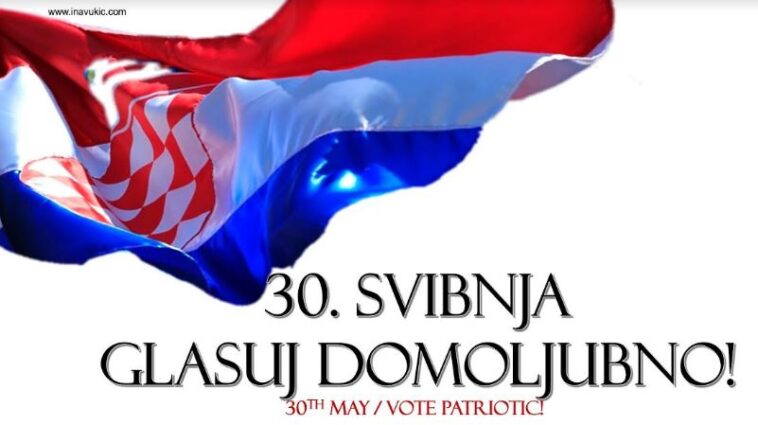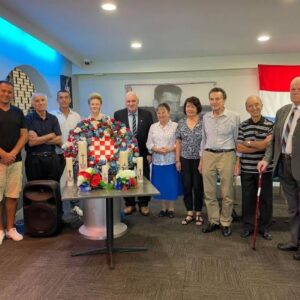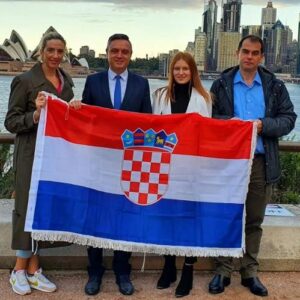30th May is Croatian Statehood Day! The date that marked in 1990 the inauguration of the Croatian Parliament as we know it today, the guardian as it were of a sovereign Croatia.
Happy Croatian Statehood Day!
In 2021 it is also the day when the Second round of local elections will be held. If the new left green We Can (Možemo) coalition wins lead positions in the Capital of Zagreb local government it will also signal an attack (either by large or small voter turnout) on Croatia’s sovereignty away from communist Yugoslavia.
People in Croatia during the last 15 years, at least, have been crying out for change! Change in political leadership that would bring about a solidification of values fought for during the 1990’s Homeland War, when almost 94% of Croatian voters said a big YES to secession from communism and Yugoslavia. Whichever way one turned it seemed the popular consensus was that Croatia needs to rid itself of HDZ/Croatian Democratic Union and SDP/Social Democratic Party as leading political parties because their governments since year 2000 had increasingly failed to modernise laws in order to move away from former communist practices, increasingly failed to cut corruption and nepotism, increasingly failed to usher in investment and development that would battle alarming unemployment and brain drain away from the country… Yet voter turnout had consistently been low for this change to actually occur.
Today, in 2021, Croatia still lives in an era of unprecedented income inequality, unnatural political elitism, corruption, non-responsive legislation to the evident needs, and skyrocketing childhood poverty just as it did under the communist/socialist regime in former Yugoslavia. In 2019 and according to the research of the Institute of Economics [“Child Poverty and Strategies for Coping with Household Poverty in Croatia”] almost 300,000 children in Croatia lived in poverty, often without basic necessities. The situation is not better today and that is an unacceptable number of children living in poverty; in a country of just over 4 million people those numbers are debilitating and devastating. The 2019 survey cited another devastating statistic: one in five members of poor families said at least one member of the household had gone to bed hungry in the month prior to the survey.
No doubt, financial insecurity increases someone’s odds of poor psychological and physical well-being. And so, one must wonder if many voters in Zagreb who have at the first round of local elections on 16 May 2021 voted significantly for the new ultra-left green hybrid of communism and socialism under the name “We Can” (Možemo) into the Council Assembly are actually still walking the communist Yugoslavia tightrope of wilful self-deception, being a Pollyanna, who only wears rose-tinted glasses and pretends the glass is half-full when it’s really not! The We Can voters as those activists involved in this political platform have certainly not learned the lesson of sustainable good life and that is: without hard work and productivity there can be no permanent exit from poverty and financial insecurity. They say they will get rid of corruption, yet corrupt and non-transparent ways define their funded activist histories! Their employment or productivity history reads activist, paid activist, NGO activist with no services provision but lots of pro-communist political claptrap, LGBTQIA intrusive pressure against mainstream Christian family values (whether you want the pressure or not)… evidently carrying the badge of approval of the communism coined phrases “State-led Corruption” and “State-led Mass Murder”!
These We Can political activists are really of the same breed as the major political parties like HDZ and SDP, who have held government both nationally and locally. The fact that they brandish the symbols and insignia of the former communist Yugoslavia as something to be celebrated, even though it murdered in cold blood at least one million of innocent people, even though the EU has branded it as criminal totalitarian regime – tells you everything about them even though the tattoo “democracy” is “embedded” upon their foreheads.
As to how much this new left hybrid of unwelcome communism and socialism that’s hiding under “We Can” name will rock Croatia’s political and economic stability in the coming four years will be seen on this coming Sunday 30th May when the 2nd Round of local elections will confirm the leading positions of Mayor, Deputy Mayor and County Governors. What happens in the Capital city of a country is usually the guiding rule as to what political mood will spread throughout the country in the coming four years. Should the We Can Tomislav Tomasevic win the Mayoral seat of Zagreb instead of Miroslav Skoro of the Homeland Movement party, for instance, Croatia should also brace itself for some serious reckoning on the streets directed against the communist past being kept alive in Croatia.
The fact that a portion of Croatia’s voters may be realigning to the Left after the Social Democrats have lost much footing on the ground in past couple of years is not so much of a concern, given the Left has always been there, but what is of grave concern is the fact that with this new Left (under We Can brand) comes a mad and brazen attempt at reaffirmation of values of communist regime of former Yugoslavia against which 94% voted in 1991! It would be communism and socialism creeping back into the Capital City, walking without recognition or respect over the dead bodies and bones of thousands upon thousands who sacrificed their lives to rid Croatia of that political and social plague in the 1990’s. I shudder at this possibility.
In local elections held in 576 local and regional government bodies in Croatia on Sunday, May 16, in 70 cities, the heads were elected in the first round of voting. Of these, the HDZ won 36 mayorships and the major opposition party, the Social Democratic Party of Croatia (SDP), managed only 13. Of the six counties that elected prefects in the first round, HDZ secured four. Other counties and cities will have runoffs on May 30 to elect their mayors and prefects.
In three major cities, the incumbent HDZ failed to achieve major breakthroughs. In Zagreb, Tomislav Tomasevic, leader of Mozemo! (We can!) from the green-left coalition, secured 45.15% votes while his nearest rival Miroslav Skoro, leader of the right-wing Homeland Movement, won 12.6% votes. In the 47-seat Zagreb City Assembly, the green-left We Can coalition won 23 seats, falling one seat short of simple majority.
In Split, the second largest city in Croatia, Ivica Puljak from the liberal Centre party won 26.82% votes and will take on Vice Mihanović from the HDZ (23.23% votes) in the second round on 30 May. In Rijeka, the third largest city and a traditional SDP stronghold, Marko Filipović from the SDP (30.25%) will take on independent centre-right candidate Davor Stimac (16.10%) in the second round.
Local elections in Croatia as elsewhere in Europe, are considered a second-order election and not so important for the national agenda. They are called as such because regularly they attracted less interest, as well as lower voter turnout, and are perceived less crucial than parliamentary and presidential elections, which form a national constellation of political relations. However, one must heed a warning that local elections in Croatia are quite pivotal because, for example, many political parties do not possess the same amount of strength or public recognition at the national level, when compared to local politics. Such parties invest all of their efforts in building local-level networks that include not only politicians but entrepreneurs and interest groups, which subsequently helps them in pushing forward with their national-level policies. This is particularly important in the atmosphere where state-controlled mainstream media outlets is very biased and discriminates against political candidates. Local elections are also significant due to the fact that decision-makers on the local level can, at the same time, perform duties on the national level. For example, one who holds a position of city mayor or county governor, can be elected to legislative body on the national level, that is, the Croatian Parliament.
Therefore, this local election race is quite significant as it will showcase the strength of two of the major political parties HDZ and SDP) as well as the strength of the emerging political forces that seem to be seen as filling the “third option” shoes in the country. At this moment the two competing for these shoes are the ultra-leftist and green We Can and the right-wing Homeland Movement led by Miroslav Skoro. Whichever wins the top position for Zagreb will signal the way that the political climate is likely to move in the immediate future. If Tomasevic wins nostalgia towards the criminal communist regime of Yugoslavia is likely to grow causing major unrests on the streets and beyond. If Skoro wins a stronger orientation towards business and new job development and a deserved strengthening of Homeland War values. The later would be what Croatia needs and must have in order to become politically and economically stable.




